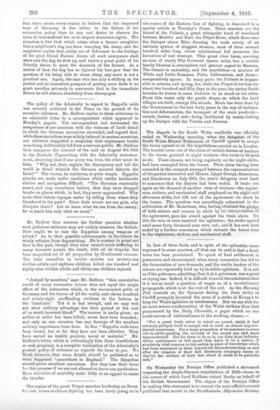In face of these facts, and in spite of the
optimistic views expressed in some quarters, all that can be said is that a fresh truce has been proclaimed. To speak of final settlement is premature and unwarranted, when every concession has led to the formulation of new demands, and the visible leaders of the miners are repeatedly held up by invisible agitators. It is not as if the grievance, admitting that it is a grievance, was a great or crying one. Indeed, it is difficult to avoid the conclusion that it is not so much a question of wages as of a revolutionary propaganda which is at the root of the evil. As the Morning Post reminds us, the Germans during the June strike at Cardiff promptly invented the news of a strike at Krupp's to keep the Welsh agitators in countenance. But we can wish for no more severe condemnation of the Welsh strikers than that pronounced by the Daily Chronicle, a paper which no one could accuse of unfriendliness to the working claseess-
"For a great trade union to reject an award, which it had solemnly pledged itself to accept, was in itself an almost unprece- dented occurrence. For a large proportion of its members to come out on strike pending the reversal of the award was still more unprecedented. But for them to do so in war time in an industry whose continuance at full speed they knew to be a matter of absolutely vital concern to the nation (a piece of knowledge which had been impressed on them beyond all misunderstanding on and after the occasion of their last disastrous stoppage) seems to deprive the strikers of their last shred of claim to be patriotic men."


































 Previous page
Previous page